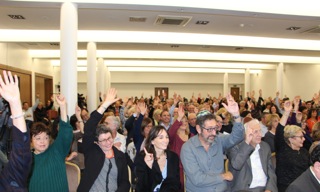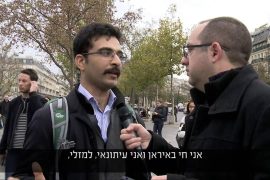1) At the Tablet, Liel Leibovitz explains “Why Believing Atrocity Stories About Israel Is Stupid, Even When They’re on CNN“.
“When a conflict breaks out, decent people feel sick. Their first impulse is to stop the violence, and protect innocent lives. So it is perfectly understandable that, watching shellings on CNN and debates at the UN and John Kerry and his spokespeople being solemnly “appalled,” even proudly Jewish viewers may conclude that all of this criticism of Israel can’t mean nothing. As the saying goes, where there’s smoke, there must also be fire.
But here’s why it’s highly unlikely that there is ever any fire under the smoke: Israel, for all of its flaws and its faults, is an open and democratic society. Its armed forces obey rules of engagement that are more restrictive than those under which American or European forces operate. Israel also grants the local and the international media largely unfettered access to its cities and to battlefields. Israel, therefore, has virtually no incentive to lie about easily verifiable matters of fact that occur in public while operating under a global microscope. You may have little respect for the current government in Jerusalem, and you may have your qualms about some or all of its policies, but, honestly, no one is that stupid.”
2) The Tower takes a look at how Palestinians in the Gaza Strip have fared under a decade of Hamas rule.
“This month marks the tenth anniversary of Hamas rule, and it’s a good time to take stock of how Palestinians have fared there compared with their counterparts in the West Bank. Gaza is home to close to two million Palestinians.
The core economic data, as provided by the Palestinian Central Bureau of Statistics (PCBS), suggest a dramatic disparity between the two.
Real per capita GDP figures, for example, show a sluggish economy in Gaza, with the number increasing from $806 to $996 in the eight years between 2008 and 2015—or a total overall growth of 19.9%; this compares with the West Bank, where the per capita GDP grew from $1,728 to $2,276 in the same period, or an overall growth of 31.2%.”
3) A special report by Palestinian Media Watch (PMW) explains the involvement of the ICRC in the mechanism of PA payments to convicted terrorists.
“According to Palestinian Authority law, all Palestinians arrested for security offenses, which includes those who committed terror attacks, receive a PA salary from the date of arrest until the day of release. These salaries increase according to the amount of time the terrorist remains in prison and range from 1,400 shekels to 12,000 shekels per month. […]
The PA Regulation 18 (2010), which established procedures for the PA payments to terrorist prisoners, states that a “wakil” – an “authorized agent” or “power of attorney” – will be appointed by the prisoner to determine who receives his salary. The regulation gives the prisoner the right to designate people other than his wife or parents.
Appointment of an “agent” can be authorized only by the prisoner’s signature on a special form. It is the ICRC that visits the prisoners and brings the form for the prisoners to sign. […]
Accordingly, the ICRC by supplying this form is facilitating salary payments to terrorists, something that is not part of the humanitarian work of the ICRC.”
4) At UK Media Watch Aron White highlights a topic that has been discussed on these pages in the past.
“But what is most significant about the Northern Ireland conflict, is that it helps show the double standard that exists in coverage about Israel. Belfast is the capital of Northern Ireland, and within it there are both Protestant and Catholic communities. All around the city there are still to this day close to 50 “peace walls,” physical walls that keep Protestants and Catholics apart. […]
Israel of course, also built a wall in order to stop violence. The Second Intifada claimed the lives of over 1,100 Israelis, as suicide bombings in cafes, buses and cinemas took the lives of innocent civilians all over the country. In 2003, Israel began constructing a barrier after attacks originating in the West Bank killed hundreds of Israelis. Since the building of the wall, there has been a 90% reduction in the number of terrorist attacks in Israel.
Yet somehow, Israel’s wall is often labelled not a security wall, but an “apartheid wall.” Why? And why are the walls keeping Catholics and Protestants apart in Northern Ireland called “peace walls” but the walls keeping terrorists out of Israel is an “apartheid wall”?”




